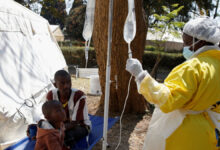Harare Closes Unlicensed Food Outlets

By Sifiso Ngwenya
Harare Metropolitan Provincial and Devolution Permanent Secretary, Tafadzwa Muguti, has taken decisive action in response to the recent cholera outbreak in the capital by ordering the closure of unlicensed and unclean food outlets.
Muguti addressed journalists in Harare on Monday, revealing that teams have been deployed to inspect and rectify the issue of unprotected wells in specific areas where shallow wells have been dug.
In his address, Muguti emphasized the importance of implementing immediate measures to combat the outbreak.
“During this outbreak, all local authorities have been directed to implement the following measures; stop unlicensed and unclean food outlets from operating in open spaces, require all shops, restaurants, and food outlets to have clean toilets equipped with running water, ensure all schools provide toilets with running water and soap for proper hand hygiene among schoolchildren, and mandate all office buildings and workspaces to have functional toilets with running water and soap,” said Muguti
He further highlighted the adverse effects of shallow wells and shallow Blair toilets in close proximity to cabins, which could significantly impact the water table.
The Harare metropolitan area has now recorded the second-highest number of cholera cases since the outbreak began three months ago, with Manicaland being the most severely affected, reporting a total of 481 cases.
Consequently, the province of Manicaland has expanded its anti-cholera efforts to include surveillance of funerals and other gatherings.
Other provinces affected by cholera include Matabeleland South (231 cases), Mashonaland West (121 cases), Mashonaland Central (80 cases), and Masvingo (41 cases).
Within Harare, the majority of cholera cases have been reported in Budiriro, Glen View, Dzivaresekwa, Mount Pleasant, Mbare, and Waterfalls.
The closure of unlicensed and unclean food outlets, coupled with the implementation of proper sanitation measures, aims to curb the spread of this waterborne disease in the affected areas.









